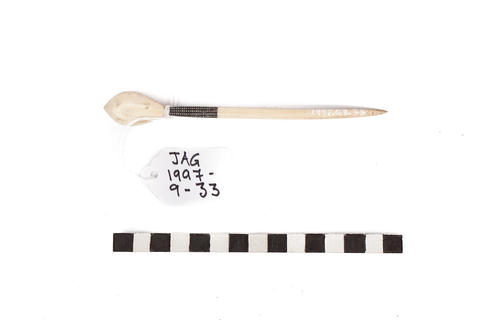Área de título y declaración de responsabilidad
Título apropiado
Spoon (view 2)
Tipo general de material
- Objeto
Título paralelo
Otra información de título
Título declaración de responsabilidad
Título notas
- Fuente del título: FHYA using JAG materials
Nivel de descripción
View
Institución archivística
Código de referencia
Área de edición
Declaración de edición
Declaración de responsabilidad de edición
Área de detalles específicos de la clase de material
Mención de la escala (cartográfica)
Mención de proyección (cartográfica)
Mención de coordenadas (cartográfica)
Mención de la escala (arquitectónica)
Jurisdicción de emisión y denominación (filatélico)
Área de fechas de creación
Fecha(s)
-
2017 - (Online curation)
-
YYYY (Making)
Área de descripción física
Descripción física
Área de series editoriales
Título apropiado de las series del editor
Títulos paralelos de serie editorial
Otra información de título de las series editoriales
Declaración de responsabilidad relativa a las series editoriales
Numeración dentro de la serie editorial
Nota en las series editoriales
Área de descripción del archivo
Historial de custodia
Alcance y contenido
Área de notas
Condiciones físicas
Origen del ingreso
Arreglo
Idioma del material
Escritura del material
Ubicación de los originales
Disponibilidad de otros formatos
Restricciones de acceso
Condiciones de uso, reproducción, y publicación
Creative Commons License: CC BY-NC-ND
https://creativecommons.org/licenses/by-nc-nd/3.0/
Unless otherwise stated the copyright of all material on the FHYA resides with the contributing institution/custodian.
Instrumentos de descripción
Materiales asociados
Acumulaciones
Nota general
Description
[Source - Nessa Leibhammer for FHYA using JAG materials, 2017: Spoon, Zulu; Material: Bone, pigment]
Nota general
Acquisition
[Source - Nessa Leibhammer for FHYA, 2017: In the 1840s 50s and 60s, after British annexation of the area known as the Colony of Natal, some colonial writers referred to the inhabitants as Zulus because of their linguistic similarities to those who lived north of the Thukela in the Zulu Kingdom. This term obscured many fissures and differences of identity that existed at the time. Towards the end of the 19th century the notion of sameness strengthened in local African communities in opposition to colonial oppression (Wright in Tribing and Untribing the Archive 2016, pp. 202, 212, 213, 214).]
Nota general
Attributions and conjectures
[Source - Nessa Leibhammer for FHYA, 2017: Comments on classification: In his ‘A Preliminary Survey of the Bantu Tribes of South Africa’, Union of South Africa, Department of Native Affairs, Ethnological Publications, Vol. 5, Pretoria, Government Printer, (1935): 7, 70-83, national government ethnologist, Nicholas Van Warmelo did not use the term “North Nguni”. He grouped people living both north and south of the Thukela, under one umbrella term, “Natal Nguni”, based on linguistic affinity. His classification was adapted by the ethnology curator, Margaret Shaw, in her 1958 “System of Cataloguing Ethnographic Material in Museums” which determined that items from the region were to be classified as “Natal Nguni: Zulu and others (not differentiated).” According to art historian, Anitra Nettleton, the classificatory system used by art galleries and museum shifted from Shaw’s model to the one where “Natal Nguni” fell away and was replaced by “North/Northern Nguni” for KwaZulu-Natal and Swaziland because scholars found it difficult to distinguish items from adjacent areas, or emmigrant people from those from the KZN region. Scholars working with the JAG materials used broad ethno-linguistic categories (Zulu, Xhosa, Tsonga, Shona, Sotho, Tswana) to identify the makers/users of the objects, all of which came to JAG without much by way of provenance, and identification was based on factors such as object type, materials, formal composition, style and surface patterning (emails A. Nettleton to N. Leibhammer, 25 and 28 November 2014).
Identificador/es alternativo(os)
Área de número estándar
Número estándar
Puntos de acceso
Puntos de acceso por materia
Puntos de acceso por lugar
Puntos de acceso por autoridad
- Five Hundred Year Archive (FHYA) ()
- Johannesburg Art Gallery (JAG) (Custodia)
- Udo Horstmann (Colección)
- No attribution ()



Material contributed by members of the public
Building an archive is a collective endeavour. Please help us grow the FHYA knowledge base.
If you want to add information to this page you can insert a hyperlink, add files and/or text to the box below.
In the case of material relevant to the FHYA as a whole please upload information HERE.
The FHYA does not vet this material but reserves the right to remove anything deemed to be racist, homophobic, sexist or otherwise offensive. Everything on the FHYA is licensed under a Creative Commons CC BY-NC-ND licence.
To make a contribution you must be a registered user. To register an account, click here. Note that after registration you will not be automatically redirected to this page.
If you have already registered but are not logged in, log in here.